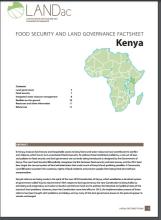Land Library
Welcome to the Land Portal Library. Explore our vast collection of open-access resources (over 74,000) including reports, journal articles, research papers, peer-reviewed publications, legal documents, videos and much more.
/ library resources
Showing items 1 through 9 of 14.This paper addresses the disjuncture between women’s formal land rights and their attaining these in practice, examining the four agrarian reforms carried out by progressive governments after 2000 in Bolivia, Brazil, Ecuador, and Venezuela.
Women face many problems with regard to land inheritance and land rights in Kenya. Individual and community land ownership do not favour women. The reason for this is that ownership of land is patrilineal, which means that fathers share land amongst sons, while excluding daughters.
SALGA supports the amendments on tenure grants although it proposed that the provision of bulk services for alternative land and the delivery of municipal services should also be included in the tenure grant.
The absence of a clearly defined land use policy in Kenya after years of independence has resulted in a haphazard approach to managing the different land use practices and policy responses.
In Kenya, insecure land tenure and inequitable access to land, forest and water resources have contributed to conflict and violence, which has in turn exacerbated food insecurity.
This book exposes the key land use and environmental problems facing Kenya today due to lack of an appropriate national land use policy. The publication details how the air is increasingly being polluted, the water systems are diminishing in quantity and deteriorating in quality.
The cadastral system2 in Kenya was established in 1903 to cater for land alienation for the white settlers. Since then, a hundred years later, the structure of the system has remained more or less the same despite major changes in surveying technology.
Conventional notions of the ‘land parcel’ have been extended: previously unrecognized tenures including customary, nomadic, or communal interests are now incorporated into the concept.
In Kenya, insecure land tenure and inequitable access to land and natural resources have contributed to conflict and violence, which has in return exacerbated food insecurity. Most farmers in Kenya have no legal title for the land on which they farm.









